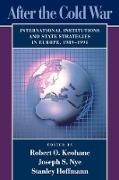Description
Product details
| Authors | Robert O. Keohane |
| Assisted by | Stanley Hoffmann (Editor), Hoffmann Stanley (Editor), Robert O. Keohane (Editor), Joseph S. Nye (Editor), Joseph S. Jr. Nye (Editor) |
| Publisher | Harvard University Press |
| Languages | English |
| Product format | Paperback / Softback |
| Released | 30.09.1993 |
| EAN | 9780674008649 |
| ISBN | 978-0-674-00864-9 |
| No. of pages | 512 |
| Dimensions | 157 mm x 238 mm x 29 mm |
| Series |
Center for International Affairs Center for International Affairs |
| Subjects |
Education and learning
> Teaching preparation
> Vocational needs
Social sciences, law, business > Political science > Political science and political administration Europe, POLITICAL SCIENCE / International Relations / General, POLITICAL SCIENCE / Public Policy / General, POLITICAL SCIENCE / World / European, EU (European Union), International institutions, Central / national / federal government policies, c 1990 to c 2000, c 1990 to c 1999, C 1980 To C 1990, c 1980 to c 1989, EU & European institutions, Central government policies |
Customer reviews
No reviews have been written for this item yet. Write the first review and be helpful to other users when they decide on a purchase.
Write a review
Thumbs up or thumbs down? Write your own review.

